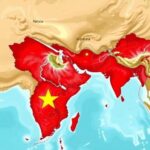Politics
AIRASIA X, ASIA, BERN, BERNAMA, BERNAMA TV, BORNEO POST ONLINE, CHINA, CIS, COMMONWEALTH OF INDEPENDENT STATES, EUROPE, EUROPE/ASIA, EXPORT, FOREIGN INVESTMENT, GA, GADOEV, INTERNATIONAL TRADE, KA, KAROMIDDIN GADOEV, KUALA LUMPUR, MALAYSIA, MEXICO, NORTH AMERICA, PETRONAS, RUSSIA, SAMARKAND, SUPPLY CHAIN, TASH, TASHKENT, TRADE, UZBEKISTAN
Clara Montgomery
Uzbekistan’s GSP+ Scheme: A Gateway for Malaysian Investors to EU Markets
Malaysian investors are urged to utilize Uzbekistan’s GSP+ to access European markets. Ambassador Karomiddin Gadoev highlighted investment opportunities in oil, gas, and tourism, alongside the advantages of establishing a joint industrial zone. The launch of AirAsia X flights aims to boost tourism and trade between Malaysia and Uzbekistan.
Malaysian investors are encouraged to leverage Uzbekistan’s strategic location as a gateway to Europe, the Commonwealth of Independent States (CIS), and China. Karomiddin Gadoev, the Uzbekistan Ambassador to Malaysia, highlighted the vast potential for Malaysian food producers and manufacturers of downstream palm oil products to penetrate these lucrative markets, benefitting from Uzbekistan’s Generalised System of Preferences Plus (GSP+) status, which allows duty-free access to 6,243 eligible goods in the European market, home to 559 million consumers.
Gadoev elaborated on the significant economic collaboration opportunities between Tashkent and Kuala Lumpur, particularly in the oil and gas sectors, urging Malaysian giants like Petronas to explore these investments. Furthermore, Uzbekistan’s government is extending attractive incentives to foreign investors, which includes tax exemptions based on investment volume, with exemption periods potentially exceeding ten years for investments over USD 15 million.
Additional benefits for investors include comprehensive tax exemptions in free economic zones and special industrial zones. Malaysian investors will find favorable conditions for business operations, implemented through streamlined customs procedures and access to developed infrastructure, as negotiations continue for a proposed joint industrial zone between Uzbekistan and Malaysia.
Tourism presents another avenue for economic connection, with Gadoev asserting that there are excellent opportunities between Uzbekistan and ASEAN countries, which have a combined population of approximately 700 million. The ambassador emphasized the development of halal and pious tourism, targeting Malaysian and Indonesian markets, specifically regarding pilgrimage tourism to sacred sites in Uzbekistan.
Moreover, the introduction of AirAsia X flights from Kuala Lumpur to Tashkent is set to enhance tourism, with hopes of establishing connections to Samarkand. Gadoev mentions that AirAsia aims to position Uzbekistan as a hub linking ASEAN countries to the CIS, facilitating increased tourism flow between East Asia and Europe, embodying Uzbekistan’s role as a bridge between varying regions of the world.
Tickets for the new route will go on sale in May 2025, with regular flights commencing in September of the same year, indicating a robust strategy aimed at promoting trade and tourism between these lively regions.
In conclusion, the strategic initiatives proposed by Uzbekistan’s Ambassador to Malaysia present a unique opportunity for Malaysian investors to access lucrative European and CIS markets via the GSP+ framework. With favorable investment incentives, the development of halal tourism, and imminent flights from AirAsia X, the prospects for bilateral economic collaboration are promising. Furthermore, the establishment of a joint industrial zone signifies a commitment to enhancing trade relations and creating a diversified economic landscape.
Original Source: www.theborneopost.com








Post Comment